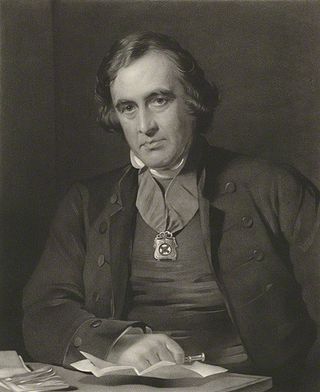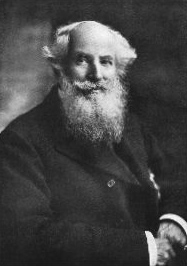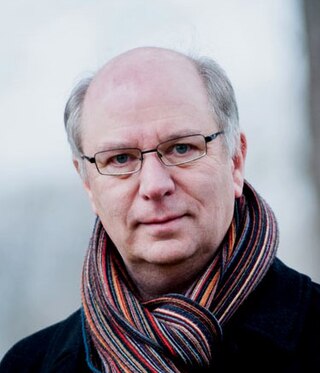Related Research Articles

The Oxford English Dictionary (OED) is the principal historical dictionary of the English language, published by Oxford University Press (OUP), a University of Oxford publishing house. The dictionary, which published its first edition in 1884, traces the historical development of the English language, providing a comprehensive resource to scholars and academic researchers, and provides ongoing descriptions of English language usage in its variations around the world.

The Surgeon of Crowthorne: A Tale of Murder, Madness and the Love of Words is a non-fiction history book by British writer Simon Winchester, first published in England in 1998. It was retitled The Professor and the Madman: A Tale of Murder, Insanity, and the Making of the Oxford English Dictionary in the United States and Canada.

William Chester Minor was an American army surgeon, psychiatric hospital patient, and lexicographical researcher.

Richard Chenevix Trench was an Anglican archbishop and poet.

Frederick James Furnivall was an English philologist, best known as one of the co-creators of the New English Dictionary. He founded a number of learned societies on early English literature and made pioneering and massive editorial contributions to the subject, of which the most notable was his parallel text edition of The Canterbury Tales. He was one of the founders of and teachers at the London Working Men's College and a lifelong campaigner against injustice.

Henry Alford was an English churchman, theologian, textual critic, scholar, poet, hymnodist, and writer.

Charles Talbut Onions was an English grammarian and lexicographer and the fourth editor of the Oxford English Dictionary.
Henry Watson Fowler was an English schoolmaster, lexicographer and commentator on the usage of the English language. He is notable for both A Dictionary of Modern English Usage and his work on the Concise Oxford Dictionary, and was described by The Times as "a lexicographical genius".

Sir James Augustus Henry Murray, FBA was a British lexicographer and philologist. He was the primary editor of the Oxford English Dictionary (OED) from 1879 until his death.

Archibald Henry SayceFRAS was a pioneer British Assyriologist and linguist, who held a chair as Professor of Assyriology at the University of Oxford from 1891 to 1919. He was able to write in at least twenty ancient and modern languages, and was known for his emphasis on the importance of archaeological and monumental evidence in linguistic research. He was a contributor to articles in the 9th, 10th and 11th editions of the Encyclopædia Britannica.
Robert William Burchfield CNZM, CBE was a lexicographer, scholar, and writer, who edited the Oxford English Dictionary for thirty years to 1986, and was chief editor from 1971.

Samuel Rolles Driver was an English divine and Hebrew scholar. He devoted his life to the study, both textual and critical, of the Old Testament. He was the father of Sir Godfrey Rolles Driver, also a distinguished biblical scholar.

The Shorter Oxford English Dictionary (SOED) is an English language dictionary published by the Oxford University Press. The SOED is a two-volume abridgement of the twenty-volume Oxford English Dictionary (OED).

James Hadley was an American philologist who taught Greek and Hebrew languages at Yale College.

The Philological Society, or London Philological Society, is the oldest learned society in Great Britain dedicated to the study of language as well as a registered charity. The current Society was established in 1842 to "investigate and promote the study and knowledge of the structure, the affinities, and the history of languages". The society publishes a journal, the Transactions of the Philological Society, issued three times a year as well as a monographic series.

John Simpson is an English lexicographer and was Chief Editor of the Oxford English Dictionary (OED) from 1993 to 2013.

Robert Henry Charles, was an Irish Anglican theologian, biblical scholar, professor, and translator from Northern Ireland. He is known particularly for his English translations of numerous apocryphal and pseudepigraphal Ancient Hebrew writings, including the Book of Jubilees (1895), the Apocalypse of Baruch (1896), the Ascension of Isaiah (1900), the Book of Enoch (1906), and the Testaments of the Twelve Patriarchs (1908), which have been widely used. He wrote the articles in the eleventh edition of Encyclopædia Britannica (1911) attributed to the initials "R. H. C."
William Holden Hutton was a British historian and a priest of the Church of England. He was Dean of Winchester from 1919 to 1930.
Robert Jowitt Whitwell B.Litt. was a British medievalist and medieval who made significant contributions to lexicography.

The Dictionary People: The Unsung Heroes Who Created the Oxford English Dictionary is a 2023 book by Sarah Ogilvie. The book examines the volunteer contributors who responded to public appeals by the Oxford English Dictionary for words. After finding address books that had belonged to editor James Murray in the basement archive of the Oxford University Press, Ogilvie conducted research into the identities of the contributors. Murray's address books, combined with those of Frederick Furnivall, included the names of some 3000 volunteers alongside the words they had submitted quotations for and which books they had used.
References
- ↑ "BRADLEY, Henry". Who's Who. Vol. 59. 1907. pp. 202–203.
- ↑ Wikisource Author Index. Henry Bradley (1845–1923).
- ↑ Henry Bradley (1911). "Cædmon". In Chisholm, Hugh (ed.) Encyclopædia Britannica. 4. (11th ed.). Cambridge University Press. pp. 394-395.
- Jenny McMorris, The Warden of English: The Life of H.W. Fowler, 2001. ISBN 0-19-866254-8.
- K.M. Elisabeth Murray, Caught in the Web of Words: James A.H. Murray and the Oxford English Dictionary, 1977. ISBN 0-300-02131-3.
- Simon Winchester, The Meaning of Everything , 2003. ISBN 0-19-517500-X.